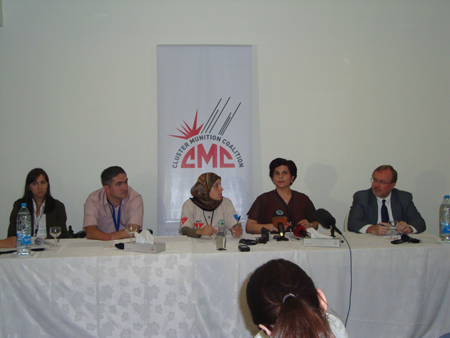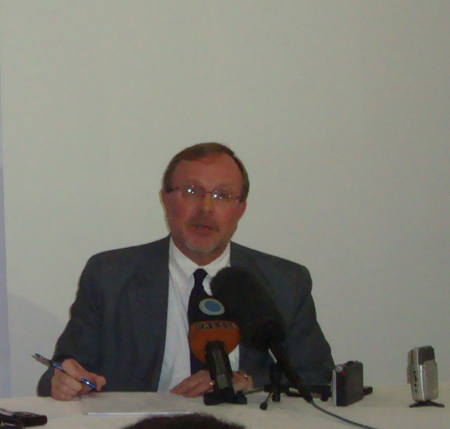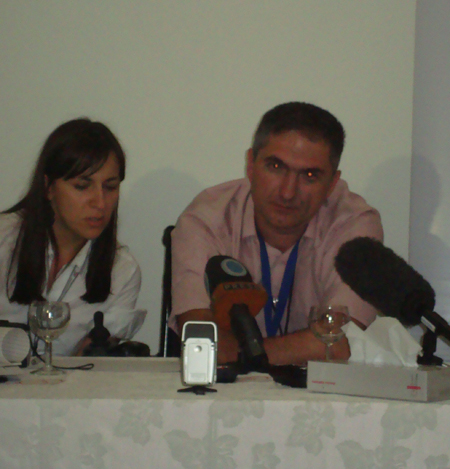2nd MSP-CCM Participants Hope: Together for a Safer Life
In the presence of hundreds of representatives from over 120 countries in the world, the workshops and sessions of the Second Meeting of States Parties to the Convention on Cluster Munitions kicked off in International Phoenicia Hotel in Beirut, Lebanon.
The long day was launched at 10:00 am (Beirut timing), and the participants looked forward to debate and affirm their stances throughout the first day of the official meeting.
Lebanese Foreign Minister Adnan Mansour was the president of the first session held, during which he noted Lebanon's commitment to the implementation of the Convention on Cluster Munitions (CCM), and the efforts it's willing to do in order to provide a safer life.
A general exchange of views then took place between the participants and states parties, among which were the signatories of the CCM.
In the opening session, Vice-President of the International Committee of the Red Cross, Mrs Christine Beerli delivered a speech in which it shed the light on the important role the media coverage played in tackling the cluster munitions issue.
Furthermore, she added that Lebanon's experience with cluster munitions changed everything; where it showed that with modern delivery systems, "millions of sub munitions could contaminate vast areas in a matter of days".
On another level, she stated that the priorities of the ICRC at the Beirut meeting, and in the broadter process of implementing the Convention are:
1- Firstly, rapid implementation of time-bound commitments in the fields of clearance and stockpile destruction
2- Secondly, ensuring measurable progress in victims assistance in the most severely affected States Parties, and
3- Thirdly, universalization of the Convention and the norms it contains
Christine Beerli noted that the most affected and contaminated cluster-bombed countries are also among the poorest in the world, therefore the implementations of the CCM should focus on the development of the countries and assistance of survivals
"Our task now is to move from political vision to practical action", Mrs Beerli stated.
Spokesperson of the coalition against the use of cluster munitions (CMC), Branislave Kapetanovic stated,
"I was very pleased that more than 100 countries have joined the CMC and 61 have ratified their membership. I hope that these states ratify their participation as this weapon is banned by international law and victims keep falling".
He further affirmed that not just stopping the use of cluster munitions but also the stockpiling, use, production, or export of these munitions should come to an end and so these weapons should be banned.
"I think it is very appropriate that the second meeting of state parties is held in Lebanon because it is a good example for the cluster munitions contaminated states. I call upon all countries to ensure the fulfillment of their obligations within the set deadlines. Several countries use these weapons for destruction, and I am calling on other states to destroy these cluster munitions as soon as possible", he added.
Across the street from the Phoenicia hotel, the Cluster Munition Coalition (CMC) on its part held a press conference at the Hotel Monroe, illustrating a combined approach in applications and procedures done within the coalition, stressing on the importance of CCM implementation.

Present in the workshop were Head of the CMC delegation, Mr. Steven Goose, who is also a Human Rights activist, organizer at the conference and CMC Habouba Aoun, Branislave Kapetanovic, cluster bombs victim, and Lamis al-Zein, a worker in the field.
Each individual expressed his or her will on working to abide by the rules and articles of the international treaty, shedding the light on personal experiences, hoping it would succeed in pushing all countries into signing and ratifying the CCM.
On his part, on behalf of the CMC, Steven Goose stated, "Our job is to push states into ratifying the convention it is not out job to ratify, but a major focus is to push the countries to sign and then ratify, we have campaigners in some 80 countries in the world and they are very busy in capitals trying to make the governments do the right thing".

In an interview with moqawama.org he affirmed that his coalition and other organizations have come to international meetings like this, and are pushing and navigating really hard to get ratifications from non-signatory countries.
However, he added, "The fact that we already have 62 countries on board, after this has only been in effect for years, is actually quite impressive. If we compare it to other international treaties, this is a very rapid pace. This shows the commitment of the governments to the treaty".
Upon question whether non-abiding states such as the US and "Israel" should be punished, Mr. Goose clarified that the obligations of the CCM cant apply to those who haven't joined, so it couldn't be said that they are doing something that is illegal for them, because they haven't joined.
"However, we are establishing a new international norm, a new international standard of behavior that all countries should adhere to", he went on to say.
"And then we think that any use of the weapon, any production of the weapon should be condemned, and in fact we have already had a very powerful impact. For example, the US now has an export-ban on the weapon, we see that in fact the US isn't producing; they have set a technical standard for the production which they have yet not been able to meet", the CMC representative affirmed.
He concluded noting, "I think that "Israel" is feeling the power of stigma against the weapon, and I think it would be very difficult for "Israel" to do what it did in 2006, and shoot millions of sub-munitions in south Lebanon. Of course we are not sure, because they are not part of the treaty".
Interested in his personal experience, moqawama.org interviewed Branislave Kapetanovic from Serbia, and who is a victim of cluster munitions, and is still despite his injury, working on the field after he was a deminer.
"I am a CMC spokesperson, and I have been in all the conferences of the treaty since the very beginning.

The first conference was in February 2007 in Oslo, and I have been at every conference relevant to the convention on cluster munitions", Kapetanovic indicated.
When asked whether Serbia is a signatory in the CCM, Branislave Kapetanovic said, "Unfortunately Serbia is not a signatory country but it organized a conference in October 2007, but since it couldn't fulfill provisions in the convention, it was temporary out of the convention, but we hope it would become a signatory".
On a different level, he noted that there are several ways to push countries into signing the treaty, however he believes that this conference is a good way and a good place to make non-signatory countries sign, because here in Lebanon there are many countries who haven't signed the convention, and in this way the convention States Parties will be able to talk to them and maybe convince them to join the treaty.
In his visit to the Sarafand, to the rehabilitation center, he was really positively impressed regarding the center, where he hasn't seen such a good developed one, even in Serbia.
As far as he has seen so far, he believes that Lebanon is implementing the CCM.
In his opening speech in the opening ceremony, he referred to Lebanon as an example to be set as a country that took great courage to deal with contaminated space and areas.
"When Lebanon is put as an example, maybe other countries would understand that they should join the treaty, and they will then receive the funds and financial assistances", he said.
"The CMC is not the one funding, it is only a force that urges countries to be aware of the treaty, and in the text of the convention, there is an article that includes that the Western more financial free countries are the ones who are supposed to donate and send funds to the cluster-bomb affected countries, that are mainly poor countries", Branislave Kapetanovic concluded.
From India there was Penelope Caswell, who has come to Lebanon to represent a British Non-Governmental Organization, specialized in demining and clearing areas from cluster bombs.
Commenting on the convention ratified since 2008, Caswell said, "I think it is a very good convention, I hope more and more countries sign the treaty".
She noted to moqawama.org that the NGO she is representing clears mines and cluster munitions in difference countries, including the African Western Sahara.
Moreover, West-African Journalist Maiga Amano from Mali expressed to moqawama.org the importance of media coverage when it comes to awareness on the issue of cluster munitions convention. He believed that the media in Lebanon have worked hard in showing people what is happening in Lebanon, regarding cluster munitions, through which some countries would be urged to sign and ratify the CCM.
"The presence of media in this kind of event is very important and useful", Amano stressed.
This is only the first day of the meeting, and a sea of people is swimming towards increasing the support to the CCM, which in this regard, plays an importance role in decreasing the impact of cluster bomb violence in the global countries, among which is Lebanon.




